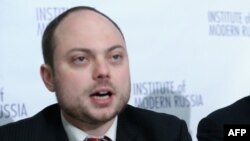The wife of Russian journalist Vladimir Kara-Murza, a prominent opposition activist and Kremlin critic, says "acute poisoning" has left her husband gravely ill in a Moscow hospital.
Yevgenia Kara-Murza said Tuesday that doctors told her "an unidentified substance" caused massive organ failure in her husband last week. The rapid and sudden deterioration in his health, which reportedly occurred just hours before he was to leave Moscow for a trip to the United States, prompted hospital staff to place the 35-year-old activist in a medically-induced coma.
Since then, Kara-Murza is said to have been in critical but stable condition. However, there have been no official medical statements about his condition or illness.
Kara-Murza's lawyer, Vadim Prokhorov, said in a Facebook post later Tuesday that police told him doctors confirmed the diagnosis of poisoning, but again there was no official statement to corroborate the attorney's account.
Earlier near-fatal bout
Yevgenia Kara-Murza said her husband's collapse last week resembled a near-fatal bout of kidney failure that he suffered two years ago. At the time, Vladimir Kara-Murza contended he had been poisoned, allegedly for political reasons. French scientists found elevated levels of heavy metals in his blood but were unable to identify any specific toxin.
Samples of Kara-Murza's blood as well as other potential physical evidence of poisoning, such as hair samples and nail clippings, have been sent for analysis abroad, including at an independent laboratory in Israel, the victim's wife said.
Before he fell ill, Kara-Murza had been traveling in Russia to promote an upcoming documentary film about Boris Nemtsov, a liberal opposition leader and fierce critic of President Vladimir Putin who was assassinated outside the Kremlin in February 2015 — gunned down on a bridge spanning the Moscow River near the Kremlin.
In Washington, U.S. Senator John McCain, a longtime critic of Putin, lamented Kara-Murza's medical crisis and hinted that the Kremlin was involved in the activist's sudden illness.
Standing on the Senate floor near a large picture of Kara-Murza, McCain hailed him as "a great fighter for freedom and a Russian patriot."
The Republican senator from Arizona told his colleagues Kara-Murza was the victim of "another shadowy strike against a brilliant voice who has defied the tyranny of Putin's Russia."
Alleged link to Ukraine information
Kara-Murza was aligned with Russian opposition groups that contend Nemtsov was killed by Kremlin operatives directed by Putin, in order to suppress evidence the activist was about to reveal showing Russia's direct military role in the conflict in Ukraine. Putin, who said Nemtsov's killing was a "disgrace" for Russia, has repeatedly denied he was involved in the case in any way.
The Kremlin also has denied any role in Kara-Murza's medical crisis.
Authorities in Moscow eventually named five Chechens as the suspected killers of Nemtsov. The suspected triggerman had been an officer in the security forces of the Kremlin-backed Chechen regional leader, Ramzan Kadyrov. The defendants have been on trial for their alleged role in the killing for several months.
Kara-Murza's grave, mysterious illness has revived stories about several other Russian opposition figures who died unexpectedly in recent years, including former Russian Cold War spy Alexander Litvenenko, who died in London in 2006 of radiation poisoning.
A formal British inquiry found that Litvinenko was assassinated in an operation that Putin "probably" approved. The Russian exile was fatally poisoned by polonium-210, a colorless, odorless and deadly radioactive substance that was slipped into his tea during a meeting at a London hotel.
Two prime suspects in Litvenenko's death — both Russians — were named, but Moscow has refused to extradite the men to Britain.





